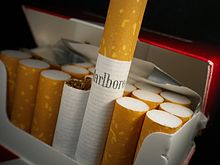
The dot-com bubble was a stock market bubble that ballooned during the late-1990s and peaked on Friday, March 10, 2000. This period of market growth coincided with the widespread adoption of the World Wide Web and the Internet, resulting in a dispensation of available venture capital and the rapid growth of valuations in new dot-com startups.

Sony Group Corporation, formerly known as Tokyo Tsushin Kogyo K.K. and Sony Corporation (ソニー株式会社), commonly known as Sony, is a Japanese multinational conglomerate corporation headquartered in Minato, Tokyo, Japan. The Sony Group comprises entities such as Sony Corporation, Sony Semiconductor Solutions, Sony Entertainment, Sony Interactive Entertainment, Sony Financial Group, and others.
Investment is traditionally defined as the "commitment of resources to achieve later benefits". If an investment involves money, then it can be defined as a "commitment of money to receive more money later". From a broader viewpoint, an investment can be defined as "to tailor the pattern of expenditure and receipt of resources to optimise the desirable patterns of these flows". When expenditures and receipts are defined in terms of money, then the net monetary receipt in a time period is termed cash flow, while money received in a series of several time periods is termed cash flow stream.
Brand equity, in marketing, is the worth of a brand in and of itself – i.e., the social value of a well-known brand name. The owner of a well-known brand name can generate more revenue simply from brand recognition, as consumers perceive the products of well-known brands as better than those of lesser-known brands.

A generic drug is a pharmaceutical drug that contains the same chemical substance as a drug that was originally protected by chemical patents. Generic drugs are allowed for sale after the patents on the original drugs expire. Because the active chemical substance is the same, the medical profile of generics is equivalent in performance compared to their performance at the time when they were patented drugs. A generic drug has the same active pharmaceutical ingredient (API) as the original, but it may differ in some characteristics such as the manufacturing process, formulation, excipients, color, taste, and packaging.

Marlboro is an American brand of cigarettes owned and manufactured by Philip Morris USA within the United States and by Philip Morris International outside the US except Canada where the brand is owned and manufactured by Imperial Tobacco Canada. Marlboro's largest cigarette manufacturing plant is located in Richmond, Virginia.

In microeconomics, substitute goods are two goods that can be used for the same purpose by consumers. That is, a consumer perceives both goods as similar or comparable, so that having more of one good causes the consumer to desire less of the other good. Contrary to complementary goods and independent goods, substitute goods may replace each other in use due to changing economic conditions. An example of substitute goods is Coca-Cola and Pepsi; the interchangeable aspect of these goods is due to the similarity of the purpose they serve, i.e. fulfilling customers' desire for a soft drink. These types of substitutes can be referred to as close substitutes.
Philip Morris USA is the American tobacco division of the American tobacco corporation Altria Group. It has been the leading cigarette manufacturer in the U.S. since the late 20th century. Its major brands include Marlboro, Virginia Slims, Benson & Hedges, Merit, and Parliament.

A private label, also called a private brand or private-label brand, is a brand owned by a company, offered by that company alongside and competing with brands from other businesses. A private-label brand is almost always offered exclusively by the firm that owns it, although in rare instances the brand is licensed to another company. The term often describes products, but can also encompass services.
Generic brands of consumer products are distinguished by the absence of a brand name, instead identified solely by product characteristics and identified by plain, usually black-and-white packaging. Generally they imitate more expensive branded products, competing on price. They are similar to "store brand" or "private label" products sold under a brand particular to the merchant, but typically priced lower and perceived as lower quality. The term off brand is sometimes used. In the United Kingdom, these products are often referred to as "own brand" items.
Philips Norelco is the American brand name for electric shavers and other personal care products made by the Consumer Lifestyle division of Philips.

Philip Morris International Inc. (PMI) is an American multinational tobacco company, with products sold in over 180 countries. The most recognized and best selling product of the company is Marlboro. Philip Morris International is often referred to as one of the companies comprising Big Tobacco.
Market dominance is the control of a economic market by a firm. A dominant firm possesses the power to affect competition and influence market price. A firms' dominance is a measure of the power of a brand, product, service, or firm, relative to competitive offerings, whereby a dominant firm can behave independent of their competitors or consumers, and without concern for resource allocation. Dominant positioning is both a legal concept and an economic concept and the distinction between the two is important when determining whether a firm's market position is dominant.
Michael A. Miles (1940–2013) was an American marketer and businessman from Washington, D.C., who served as chief executive of Kentucky Fried Chicken, Kraft Foods, and Philip Morris Companies, and as a director on the board of Time Warner, Sears Holdings Corporation, Dell Inc., AMR Corporation, and Citadel Broadcasting Corporation. From 1961 to 1971 he was an advertising executive at Leo Burnett Co. He was also a trustee of Northwestern University. He died on November 10, 2013, from complications of a brain tumor.

Merit is an American brand of cigarettes, currently owned and manufactured by Philip Morris USA in the United States and Philip Morris International outside the United States.
Value-based price is a market-driven pricing strategy which sets the price of a good or service according to its perceived or estimated value. The value that a consumer gives to a good or service, can then be defined as their willingness to pay for it or the amount of time and resources they would be willing to give up for it. For example, a painting may be priced at a higher cost than the price of a canvas and paints. If set using the value-based approach, its price will reflect factors such as age, cultural significance, and, most importantly, how much benefit the buyer is deriving. Owning an original Dalí or Picasso painting elevates the self-esteem of the buyer and hence elevates the perceived benefits of ownership.
PMFTC, Inc. is the Philippine affiliate of Philip Morris International (PMI). Owned 50-50 by PMI and local conglomerate LT Group, PMFTC is the leading cigarette manufacturer in the Philippines, controlling over 90% of the local market, commercialising the brands Hope Luxury, Marlboro, and More, among others.

Hoarding in economics refers to the concept of purchasing and storing a large amount of product belonging to a particular market, creating scarcity of that product, and ultimately driving the price of that product up. Commonly hoarded products include assets such as money, gold and public securities, as well as vital goods such as fuel and medicine. Consumers are primarily hoarding resources so that they can maintain their current consumption rate in the event of a shortage. Hoarding resources can prevent or slow products or commodities from traveling through the economy. Subsequently, this may cause the product or commodity to become scarce, causing the value of the resource to rise.

Debranding is a marketing strategy to remove the manufacturers name from a product to appear less corporate, or to save on advertising. De-corporatizing is when a company removes its name from its logo for a marketing campaign in an attempt to make themselves appear less corporate and more personal. "Transitioning into generic" is when a company with a well-known brand opts to appear more generic. This means the company will eliminate advertising and reduce prices and debranding in this sense can increase profit margins.

In business, a unicorn is a startup company valued at over US$1 billion which is privately owned and not listed on a share market. The term was first published in 2013, coined by venture capitalist Aileen Lee, choosing the mythical animal to represent the statistical rarity of such successful ventures.











